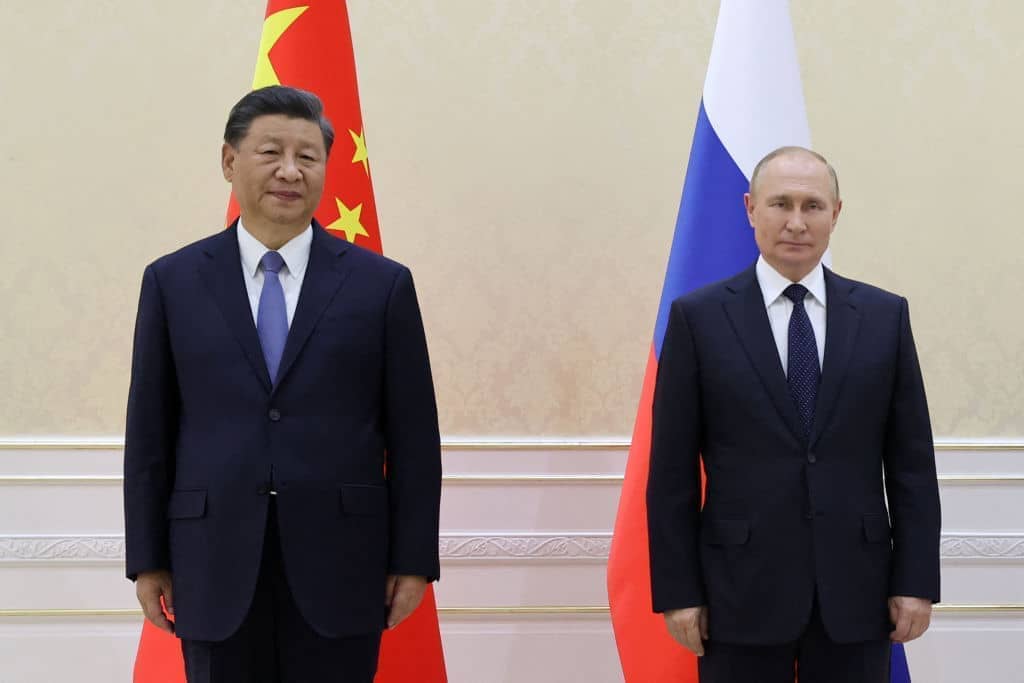To say that Vladimir Putin is giving autocracy a bad name is rather to state the obvious. But it now appears to have dawned even on his ‘old friend’ Xi Jinping that Russian incompetence and cruelty in Ukraine is undermining their joint ambition to re-write the international order.
Putin’s admission that Beijing might have ‘concerns’ about his bungled war was cryptic but striking. ‘We highly value the balanced position of our Chinese friends when it comes to the Ukraine crisis,’ Putin said in remarks ahead of their meeting in Uzbekistan. ‘We understand your questions and concerns about this. During today’s meeting, we will of course explain our position.’
Xi was vague in his response, telling Putin that China was ready to work with Russia, ‘in extending strong support to each other on issues concerning their respective core interests,’ according to Xinhua, the Chinese state news agency. There was no direct mention of Ukraine in either Xi’s public remarks or in official Chinese read-outs of their meeting. Rather like Voldemort of Harry Potter fame, Ukraine had become for China ‘He Who Shall Not Be Named’.
The way Putin is going about the war, the bungling and the very public brutality, is dulling Beijing’s support
It was all a sharp contrast to the triumphalism of their last face-to-face meeting in Beijing in February. That took place on the eve of the Winter Olympics and just over two weeks before Putin’s invasion, the two autocrats declaring the arrival of a ‘new era’ of international relations. They shared a vision of a new world order safe for autocrats, in opposition to the west, and famously declared their friendship ‘without limits’.
Their meeting this week could not have come at a worse time for Putin, just days after the routing of Russian forces in northeast Ukraine and Moscow’s vindictive revenge strikes against Ukrainian civilian infrastructure. Reports emerged this morning that Ukrainian troops have found hundreds of bodies buried in a mass grave in woods near the town of Izyum, which was recaptured a week ago.
The venue for their summit was awkward for both leaders. It was on the sidelines of a meeting of the China-led Shanghai Cooperation Council (SCO), which was originally set up as an instrument for Beijing to extend its influence among the former Soviet Central Asian republics. Moscow and Beijing have fought a low-level battle for influence in the region. Russia regards the energy-rich area as its traditional area of influence, though Beijing’s greater economic clout has increasingly given China the upper hand. Uzbekistan, Kazakhstan, Kyrgyzstan, Tajikistan, and Turkmenistan – the ‘stans’ as they are often collectively called – have sought with varying degrees of success to exploit the competition between their giant neighbours.
Most of the stans have substantial Russian minorities, and there is widespread unease at Russian aggression against Ukraine, Putin’s broader imperial ambitions and his almost messianic quasi-ideology of the Russkiy Mir (Russian World). Viewed from central Asia, the biggest geopolitical threat comes from the revisionism of their former Russian overlords. This goes some way to explaining the cryptic and cautious words of Xi and Putin: bear-hugs and table-thumping rhetoric would not have gone down well with their SCO partners.
The summit in the ancient Uzbek city of Samarkand was Xi’s first trip outside China since January 2020, before the world went into Covid lockdown. His first port of call en route was Kazakhstan, where, according to China’s state broadcaster CCTV, Xi told Kazakh President Kassym-Jomart Tokayev that China firmly supports Kazakhstan in ‘safeguarding national independence, sovereignty and territorial integrity’. Tokayev was probably too diplomatic to remind his visitor that in Ukraine, Russia has violated all three, but the remark will not have gone unnoticed.
Yet some caution is required. Xi is not about to ditch Putin. He is too heavily invested. Their world view is too similar. Xi has repeatedly endorsed Putin’s justifications for the war in Ukraine and blamed the west for provoking it. He has refused to condemn the invasion and has given Russia diplomatic cover at the UN. Chinese state media has amplified Russian disinformation, even echoing Moscow’s claims that well-documented atrocities were staged.
A few days before the Uzbekistan meeting, Li Zhanshu, the third-ranking member of the Communist party of China reportedly told a group of Russian lawmakers in Vladivostok that China ‘understands and supports Russia,’ particularly ‘on the situation in Ukraine’. That followed a week of joint military exercises, Vostok 2022 (East 2022) in Russia’s far east and the Sea of Japan.
There is little evidence that Xi has issues with Putin’s goals – they continue to have a shared strategic interest in countering the west. It is the way Putin is going about it, the bungling and the very public brutality, that is dulling Beijing’s support, with China increasingly tainted by association. Ukraine’s routing of Russian forces in northeast Ukraine has undoubtedly alarmed Chinese leaders, according to Shi Yinhong, a professor of international affairs at Renmin University in Beijing. ‘China will no doubt grow even more cautious after Moscow suffered severe setbacks in Ukraine and by no means wants to get entangled, directly or indirectly, in the protracted conflict,’ he told the South China Morning Post, predicting that the Xi-Putin meeting is unlikely to yield substantive results.
Since the invasion, China has bought record levels of Russian oil. Moscow hopes Chinese trade will help blunt western sanctions, and that in the medium term far more of its energy exports can go east. During the SCO summit, Putin and Xi met with Mongolia’s president to discuss the construction of more oil and gas pipelines to transit that country. While Washington has grumbled about growing Russian-Chinese economic ties – the Commerce Department in June added five Chinese electronics companies to a trade blacklist for allegedly helping Russia’s defence industry – China has largely been careful to avoid violating sanctions that could lead to it being penalised as well. There is no evidence that China is supplying weapons to Russia for use in Ukraine.
The Ukraine war has certainly given China the upper hand in its relationship with Russia. But as this week’s events demonstrate, that will come as little comfort when the ultimate goal of that partnership, a rewriting of the global order, is being eroded with every instance of Russian incompetence and brutality.







Comments